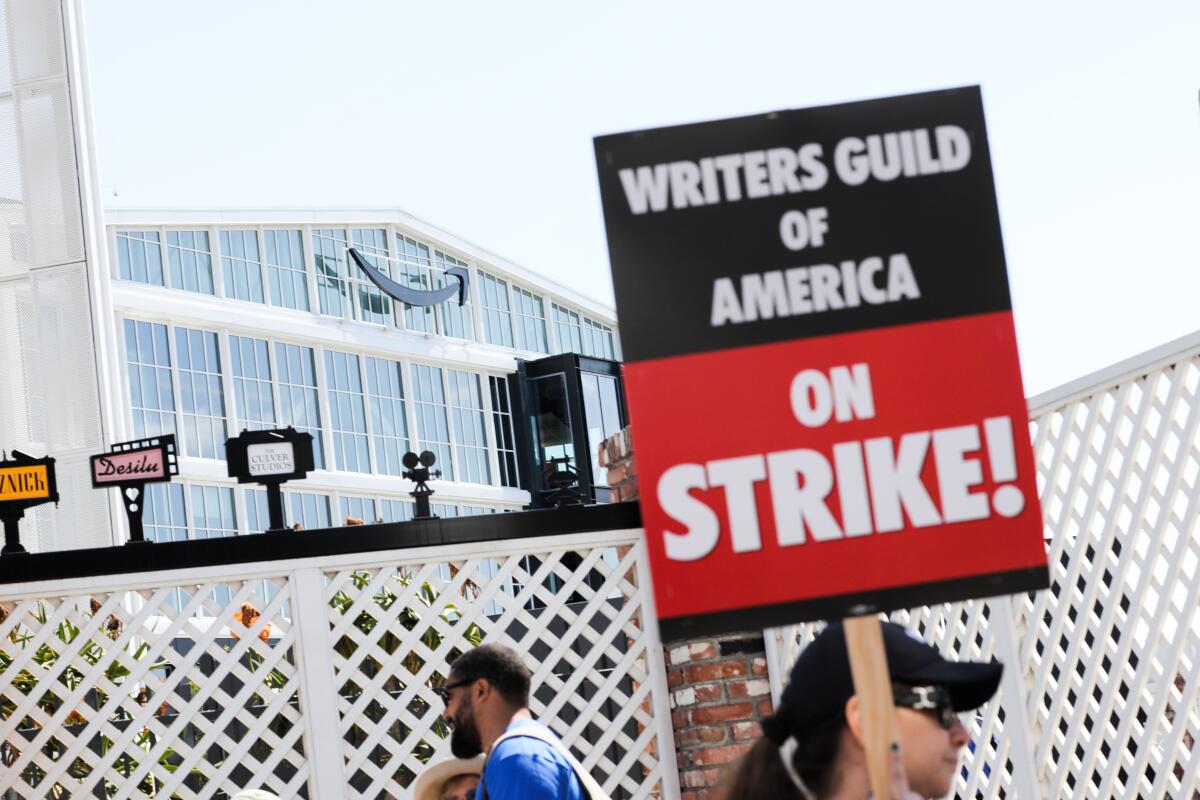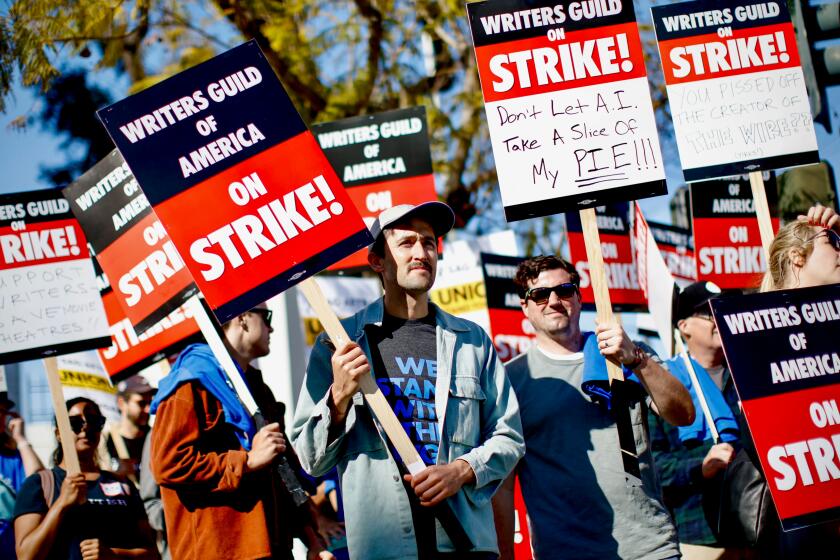L.A. has a major stake in settling the Hollywood writers’ strike

- Share via
Hollywood writers put down their pens this week to strike for the first time in 16 years. The Writers Guild of America and the film, television and streaming studios could not reach agreement over pay and working conditions amid an industry upheaval that’s remade how artists create and viewers consume entertainment.
By all accounts, the writers and studios are far apart on the key issues, and the strike could last for months.
The longer the strike drags on, the more its effects will be felt across the region. Although L.A. is not a one-industry town, the film and television business is among its most important economic engines. The work stoppage, particularly if it’s prolonged and shuts down more productions, will extend to people throughout the industry — the camera operators, production assistants and others who work on set — and those who benefit from industry spending, including the restaurants, hotels and dry cleaners.
The 100-day strike in 2007-08 cost the local economy an estimated $2.1 billion and some 37,700 jobs, according to an analysis by the Milken Institute.
If I were starting now, I wouldn’t have been able to stick it out and make a career for myself as a TV writer in Hollywood.
Since the last strike, the industry has grown, driven by the streaming revolution, along with its footprint in Los Angeles. Netflix, Apple, Amazon and other media companies have opened studios or expanded their presence in the region to pump out more content for streaming services.
Like the last strike, this one is driven by a transformation in the way we get our entertainment. Fifteen years ago, the industry was adjusting to the emerging world of online entertainment. One of the big fights was over writers’ share of DVD sales revenue. There was an understanding at the time that the traditional TV and film model was going to change, along with writers’ compensation, but few understood just how much.
Today, the digital revolution and streaming boom have upended the industry, and that’s the core of the latest dispute between writers and the studios.
The Writers Guild, which represents more than 11,000 writers for film and television, says the streaming revolution has worsened pay, working conditions and career advancement for screenwriters.
Faced with a crisis of “runaway production” that is threatening one of Los Angeles’ signature industries, California lawmakers are poised to quadruple the amount of money available to help persuade film and television productions to remain in the state.
It’s been particularly hard for TV writers, who are typically paid per episode. Traditional broadcast television shows have more than 20 episodes per season, providing longer stretches of stable employment. Streaming shows have eight to 12 episodes. And streaming services have increasingly used “mini-rooms” with fewer writers for shorter periods, with writers often dismissed before shooting begins so they don’t get the on-set experience necessary to move up in the industry.
Writers worry the trend is turning screenwriting into a “gig economy” job, and the union has pushed for six to 12 writers to create a show and that writers be engaged for at least 10 consecutive weeks, along with higher pay.
The Alliance of Motion Picture and Television Producers, which includes Netflix, Amazon, Apple, Disney, Discovery-Warner, NBC Universal, Paramount and Sony, has rejected the guild’s requests for a hiring quota and longer employment commitments. Studios went on a spending spree in recent years to launch their streaming services with lots of original programming. Now under pressure from Wall Street to boost profits, they’re cutting employees and productions. The companies may have financial incentive to allow the shutdown to continue, at least in the short term, which doesn’t bode well for a fast agreement.
The strike has already shut down late-night television talk shows, which rely on writers for daily monologues and skits. On-location shooting slowed in the first months of 2023, in part because some companies were reluctant to start productions that would be disrupted by the strike, according to FilmLA, which handles film permits for the city and county. And it’s expected that more shows will pause production as the strike continues and there’s no one to write or revise scripts.
California recognizes the entertainment industry’s importance to the state and regional economy. Since 2009, lawmakers have allocated more than a billion dollars in tax credits to keep productions from being lured to other states with incentives. The argument for subsidizing Hollywood at the expense of social services, education and other government programs is that the state ultimately benefits from the tax revenue, quality jobs and economic growth that come with being the heart of the entertainment industry.
After the pandemic shutdowns and the slow recovery, nobody wants to see more people lose paychecks. Yet, for writers and others in the entertainment business, this is an existential moment. These aren’t easy issues to resolve, but it’s vital that media companies and the Writers Guild get back to the negotiating table and try. There’s too much at stake, and not just for the studios and the writers. Los Angeles and California also have an interest in the success of the studios — and in the success and livelihood of the people who create the studios’ content.
More to Read
A cure for the common opinion
Get thought-provoking perspectives with our weekly newsletter.
You may occasionally receive promotional content from the Los Angeles Times.










